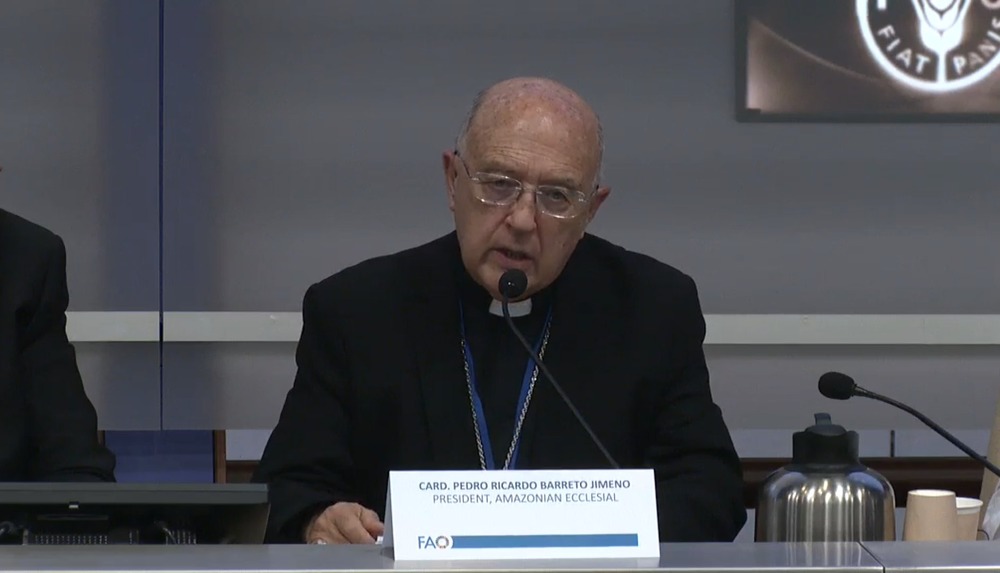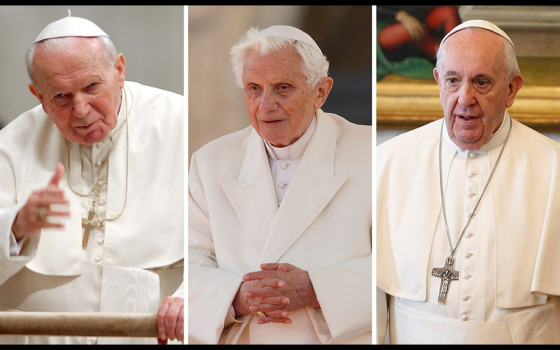
Peruvian Cardinal Pedro Barreto Jimeno, president of the Amazonian bishops' conference (CEAMA), speaks at an event on the Amazon at the headquarters of the U.N.'s Food and Agriculture Organization in Rome June 4, 2024. (CNS screengrab/FAO)
The emphasis on listening, dialogue and discernment central to the Synod of Bishops on synodality originated from the periphery of the universal Catholic Church — in the Amazon — and its fruits are now challenging the church worldwide to adopt a spirit of communal participation and decision-making in the church, said the cardinal in charge of the synod.
The 2019 synod on the Amazon was an important precursor to the current synod on synodality by offering the church a method of dialogue, "which starts by recognizing the human being as an active subject, a protagonist of his or her own future," said Cardinal Mario Grech, synod secretary-general.
In both the Amazon synod, and the current synod on synodality, "the church did not want to impose pre-packaged solutions but stepped down from its authoritative chair and listened to a situation, a reality, a cry, a call for help from the people of that region," the cardinal said June 4 at an event on the Amazon at the headquarters of the U.N.'s Food and Agriculture Organization in Rome.
Rather than seeking to provide answers to the environmental crises and the suffering of local populations in the Amazon, the synod developed a method of synodality that "has really challenged the center of the church and global society," he said.
"I am deeply convinced that even in international politics, a true listening which takes seriously the fears, anxieties, desires and hopes of individuals and communities can really become generative of creative, healthy solutions for the coming good of the entire international community," he added.
At the event, the Vatican presented a volume compiling the acts of the Amazon synod. The special assembly reached some 87,000 people in the Amazon region in its preparatory phase and resulted in Pope Francis' apostolic exhortation "Querida Amazonia" ("Dear Amazonia").
Advertisement
Peruvian Cardinal Pedro Barreto Jimeno, president of the Amazonian bishops' conference (CEAMA), which was born out of the concluding document from the 2019 synod, joined Grech at the anniversary event.
He noted that CEAMA is the first structure of its kind in the history of the church, "since all of the baptized, the people of God, participate."
Barreto said the mention of CEAMA in the synthesis report from October 2023 synod assembly as an example of a church reality "that integrates communion, mission and participation" was both "encouraging and challenging" for the church in the Amazon.
CEAMA was formally established by Francis in 2022. The conference's vice presidents include a cardinal, an Indigenous woman religious, an Indigenous laywoman and a lay man who researches issues related to the Amazon.
The conference held its first ordinary assembly in August 2023 and was attended by more than 70 people — including at least five representatives from each of the seven bishops' conferences in the Amazon region: one bishop, one priest or deacon, one consecrated religious person, a lay person and a representative of Indigenous peoples.
Cardinal Michael Czerny, prefect of the Dicastery for Promoting Integral Human Development, said that the Amazon synod "marked a beginning of a new and more important stage in this shared journey" of engaging and discerning the signs of the times as a church, particularly on climate issues.
The creation of CEAMA was "a very significant fruit of the synodal process," he said, and other new networks and initiatives "inspired by the Amazon synod are beginning to sprout in other areas as well, such as the Congo Basin in central Africa, the Mesoamerican Biological Corridor extending from Panama to southern Mexico, the Asia-Pacific biome, the Guarani Aquifer and the Gran Chaco in South America.
"We know that renewal can come from the periphery," the cardinal added. "Just as the biodiverse Amazonia plays a vital role in the health of the planet, so too a church with an Amazonian visage, an Amazonian face, calls the wider church and all society to conversion."
Barreto highlighted the urgent need to foster collaboration in addressing key issues in the Amazon, noting that the "synodal process continues today with more evidence of the social and environmental problems" in the region, such as "the murder of defenders of the environment, deforestation, illegal mining and the destruction of nature."
"To affect the Amazon is to also affect all of humanity," he said.
Sister Laura Vicuña Pereira Manso, a member of the Congregation of Franciscan Catechists and of the Indigenous Kariri people and one of the vice presidents of CEAMA, praised the efforts of the church to partner with local Indigenous communities in addressing climate-related issues. However, she said that ultimately society is "not going to the deeper problem to address the great climate crisis we are having."
"Are we willing to consume less? This is the deeper question that we need to ask," she said. "Are we willing to respect Indigenous territories to ensure that mining does not enter? Or illegal deforestation?"





